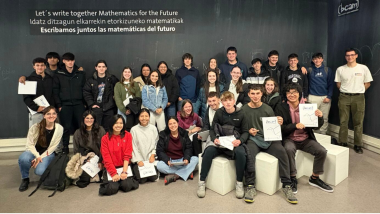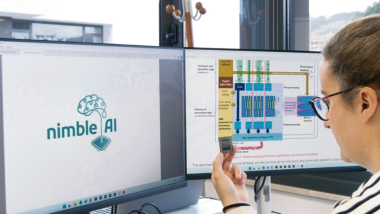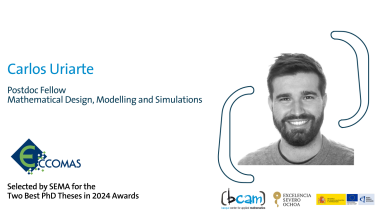Iñigo Bidaguren will defend his doctoral thesis on Friday, June 28th
- The defense will take place in the School of Engineering of the University of the Basque Country located in Bilbao, at 10:30 am
Iñigo Bidaguren joined the Basque Center for Applied Mathematics - BCAM in 2013 as a PhD student thanks to a collaboration agreement between the center and the University of the Basque Country. He is and undergraduate Technical Engineer (2001, UPV/EHU) and holds a Master in Industrial Engineering (2007, UPV/EHU) and a Master in Sustainable Energy Engineering (2011, UPV/EHU).
Between 2001 and 2009 he worked as a Product Engineer in BATZ, a products and services supplier for the automotive sector, where, upon other assignments, he collaborated on the creation of 3 patents. Since 2009 he is a lecturer at the Nuclear Engineering and Fluid Dynamics Department of the University of the Basque Country.
He concluded his PhD Thesis on Snapshot based Reduced Order Methods (ROM) applied to Computational Fluid Dynamics (CFD) simulations under the supervision of Dr. Jesús María Blanco Ilzarbe (UPV/EHU) and Dr. Lakhdar Remaki (Alfaisal University, BCAM).
On behalf of all BCAM members, we would like to wish Iñigo the best of luck in his upcoming thesis defense
PhD Thesis title: Snapshots location for Reduced Order Models: An approach based on Proper Orthogonal Decomposition and Mesh Adaptivity Techniques
Solving Partial Differential Equations (PDE), is a key issue in science and engineering since they are widely used in many real problem modelling including fluid mechanics, acoustics, heat and mass transfer ...etc. Exact solutions for PDEs and Ordinary Differential Equations (ODE) can be obtained in a very few and simplified cases only, numerical approximations are used instead (i.e. Finite Volume Method (FEM), Finite Volume Method (FVM)...). However, and despite the availability of important supercomputing facilities, due to the huge number of degrees of freedom these methods have, they may still suffer from cost-effectiveness performance. They are mainly two contexts where one need to solve PDEs with a lower computational cost: Real-time context and Many-query context. Examples for the former are: parameter-estimation, control, flying simulator..., and for the latter: optimization, multi model/scale simulation... To reduce significantly simulation time (often on the expense of accuracy) Reduced Order Modelling (ROM) techniques are introduced. The main idea is to reduce the initial solving space dimension (as in finite elements method) to a subspace with a significantly reduced dimension and then solve for the projected solutions. Proper Orthogonal Decomposition (POD) is one of the more used ROM strategies. The presented work focuses on this technique, which has two challenging steps: (i) the snapshot location and (ii) the error estimate on the parameter space that drive the process to search new snapshot location. As a consequence of these two steps, POD applied to PDEs is considered as belonging to the well-known Greedy Algorithm family. This thesis brings a mesh adaptivity approach as the process to find the new parameter space locations. This process will be driven by a new error estimate based on \textit{Leave One Out Cross Validation} (LOOCV) technique. We could say that this error estimate is universal, in the sense that it is not problem dependent. In addition, it is well known POD lack of accuracy when dealing with PDEs which solution contains shocks. Here, a new interpolation approach improves this, for shocked solutions. Finally, we present that the POD reduced basis is optimal just in average, and a new local basis is presented (Sorted Gram-Schmidt (SGS)) to be coupled with POD one. The criteria to decide which basis is better to be used for each new parameter value is defined as well. The whole proposed strategy efficiency is validated against a mathematical (exact) solutions of an incompressible, steady state flow equations, and on CFD solutions of an inviscid flow around a NACA0012 airfoil.
Related news
About the center
About the center




